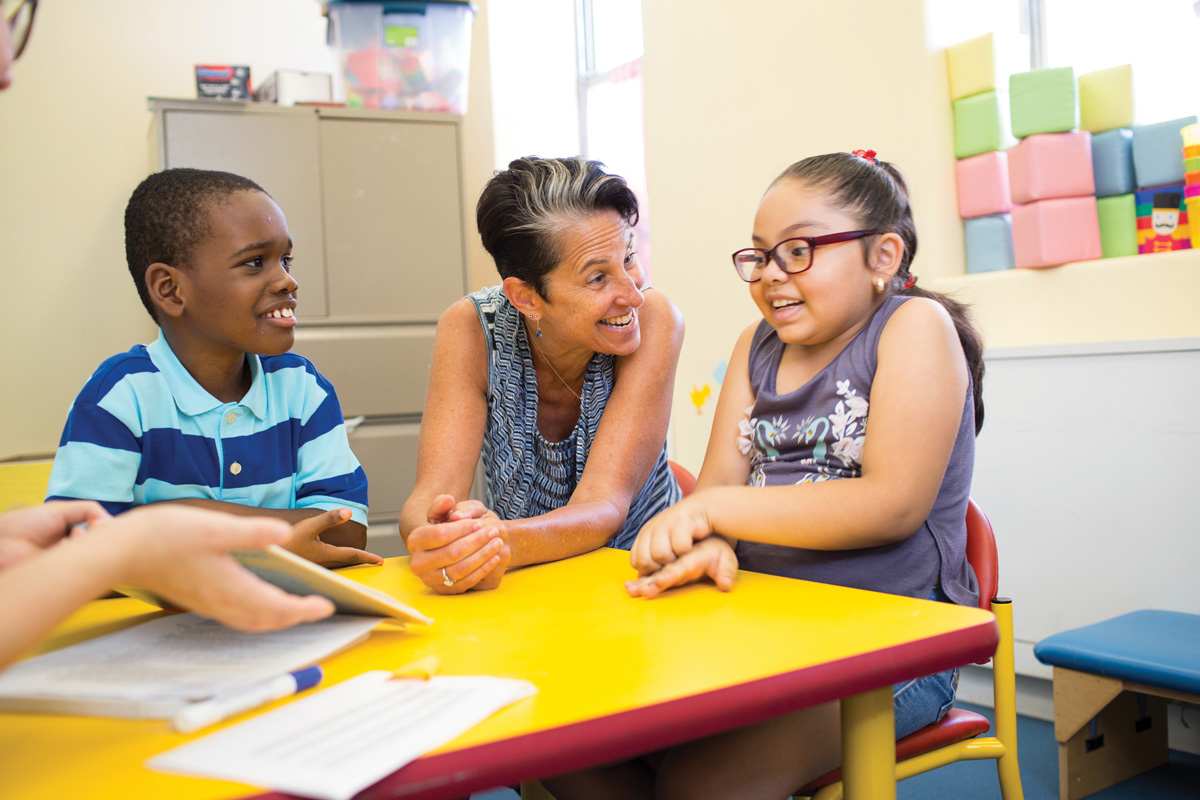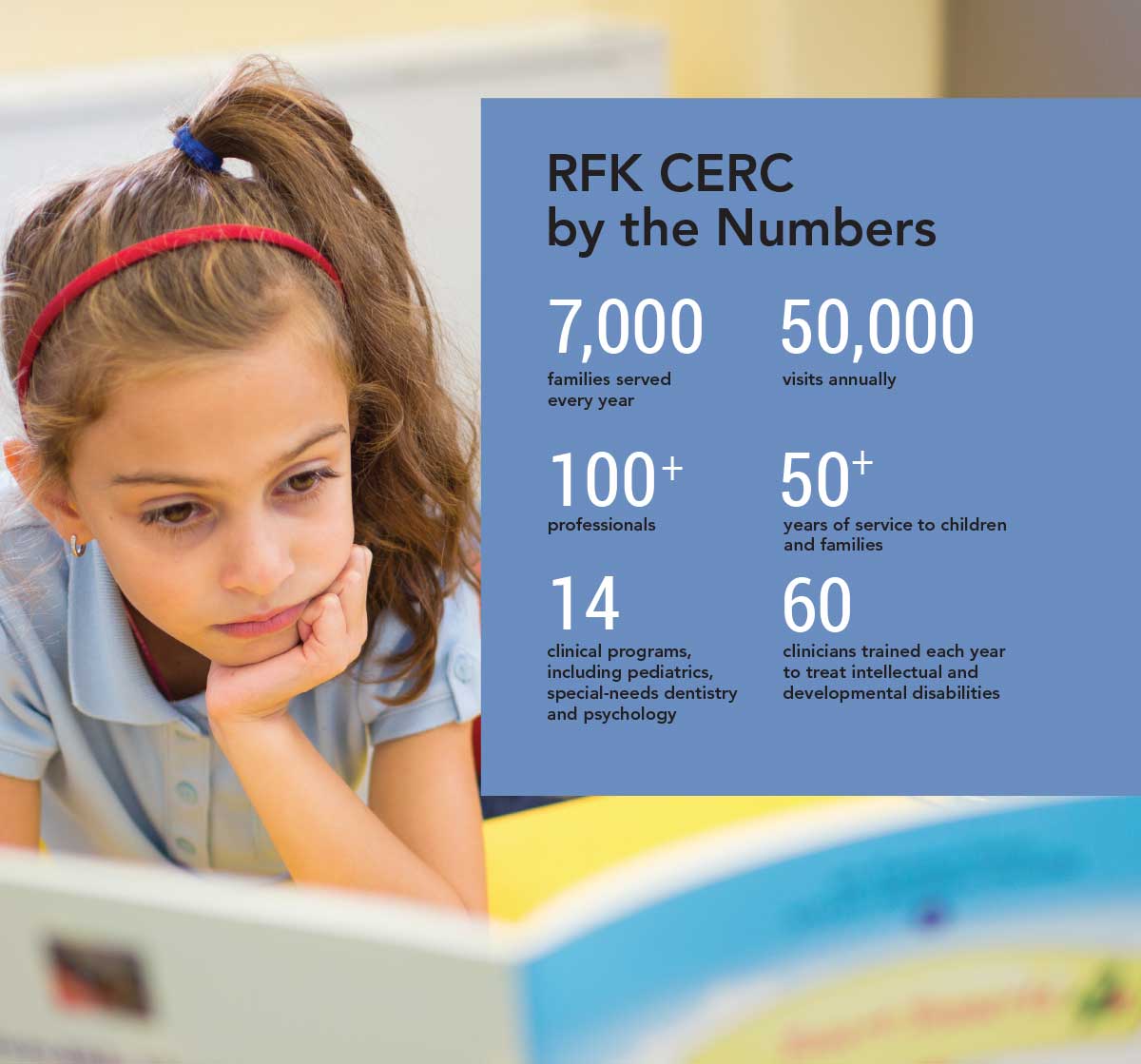
Serenity entered the world drug-exposed and endured a chaotic childhood. When her daughter Pearl was born 15 years ago, Serenity feared she wouldn’t know how to be a good mother. She came to Einstein Montefiore’s Rose F. Kennedy Children’s Evaluation and Rehabilitation Center (RFK CERC) to learn how to care for and support her child in a way her own mother never could. Serenity attended RFK CERC’s intensive parent-child program to explore new ways of reading, singing and communicating with Pearl.
 Nancy Tarshis, M.A., M.S., supervisor of RFK CERC’s Speech and Language Services, with two patients.
Nancy Tarshis, M.A., M.S., supervisor of RFK CERC’s Speech and Language Services, with two patients.

A few years later, she gave birth to Jayden and noticed that he wasn’t developing as Pearl had. RFK CERC’s developmental behavioral pediatrician and speech-language team soon made a diagnosis of autism.
More than 7,000 infants, children and parents visit RFK CERC every year. Families like Serenity’s come to address problems related to childhood development, behavior and trauma.
“If you have a child with a disability, we have something here that could be useful to you, regardless of the child’s age or issues,” says Theodore Kastner, M.D., M.S., director of RFK CERC.
RFK CERC has provided those resources to children and their parents for more than 50 years, offering a full range of services from speech therapy to dentistry. “We view each person in a holistic way, rather than as a set of symptoms or problems,” says Anne Murphy, Ph.D., clinical director of
RFK CERC.
The Affordable Care Act allowed the New York State Department of Health to launch a new program called Medicaid Health Homes, aimed at extending healthcare to more children and families. Health Homes are not actual physical spaces but rather an approach to coordinating care using comprehensive care managers, who serve as patients’ guides through a complex healthcare system. RFK CERC opened the Montefiore Health Home in December 2016; it was the first Health Home in New York State.
In the past, if a child had a developmental disability or a mental illness and also was diagnosed with a chronic illness or HIV, he or she might have two or three separate case managers, each writing a separate care plan for the medical problem the manager oversaw. Reconciling these siloed plans proved inefficient and complicated, leading to suboptimal care.
Now, with Health Homes, each family partners with one central care manager responsible for helping that family with everything it needs, from primary care to housing. The result: less-frequent trips to the emergency room, fewer days in the hospital, improved quality of care and lower overall healthcare costs.
Dr. Murphy points to the Montefiore Health Home care managers as key to helping families cope with the stresses of poverty and mental and physical illness. “The vision of RFK CERC is to keep children at home with their parents,” she says. “Care managers bring the work
we already do here and take it intopeople’s homes.”
Some 24,000 Bronx children are eligible for Health Home care, according to Dr. Kastner. “When we opened, we served 40 of those kids. We think we can build our capacity to serve nearly 1,000 this year. The biggest challenge for us is going to be raising capital to hire the staff and get them in place.”
With $25 million in endowment funding, RFK CERC can bring 100 additional care managers into CERC’s already strong programs and provide the onboarding, training and access to resources they need. Dr. Kastner projects that the Health Home program will be self-sustaining after this initial start-up phase.
RFK CERC has helped Serenity become a different kind of parent to her children. Pearl is thriving in high school, and Jayden, now 12, still comes to RFK CERC every Friday before school for speech therapy. With the Montefiore Health Home, RFK CERC is poised to help thousands more parents like Serenity take good care of their children.
